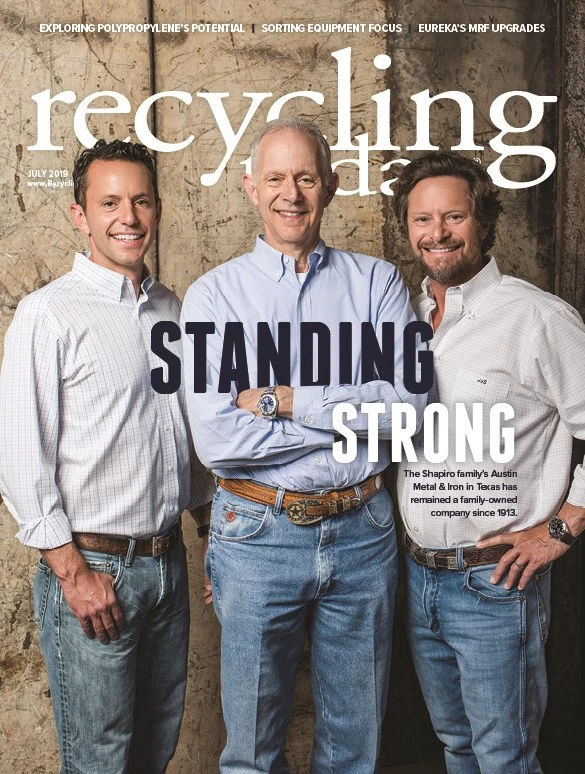The 2019 market for plastic scrap has been challenging, according to portrayals from delegates representing the Bureau of International Recycling’s (BIR’s) Plastics Committee at the Brussels-based association’s 2019 World Recycling Convention & Exhibition. The event was May 19-22 in Singapore.
Steve Wong of Hong Kong-based Fukutomi Recycling Ltd. said “almost all types of recycled polymers are not selling well” in East Asia. He added, “Profit margins are narrow and getting less and less” for plastics recyclers.
Clement Lefebvre of Veolia Proprete France Recycling, Paris, said European primary producers “now want to play a role in the recycling world,” which could help absorb European plastic scrap that formerly headed to China, Malaysia and Thailand. (Within days of the BIR convention’s conclusion, Malaysia’s government said it would begin returning imported plastic scrap shipments to their countries of origin.) In the next 10 years Europe may need to develop more than 1 million metric tons of capacity, “and that’s a huge challenge,” he said.
“The plastic industry is in a transition phase from a linear model to a circular economy model.” – BIR Plastics Committee Chairman Henk Alssema of Netherlands-based Vita Plastics
In the U.S., export markets also “have been greatly reduced,” said Sally Houghton of the Plastic Recycling Corp. of California, Sonoma. Within the U.S., however, Houghton said demand was healthy for high-density polyethylene (HDPE) and polyethylene terephthalate (PET) scrap, with polypropylene (PP) attracting significant investments in domestic recycling capacity.
BIR Plastics Committee Chairman Henk Alssema of Netherlands-based Vita Plastics, said, “The plastic industry is in a transition phase from a linear model to a circular economy model.”
A panel at the Re|focus Sustainability & Recycling Summit, May 20-22 in Grand Rapids, Michigan, illustrated this transition. Representatives from companies that traditionally have dealt in virgin plastics described their efforts to vertically integrate into recycled content production.

LyondellBasell’s Ganesh Nagarajan, who is based in Houston, said his company has been working to advance mechanical recycling through its strategic partnership with the French solid waste and recycling company Suez and their joint acquisition of the plastics recycler Quality Circular Polymers (QCP), Sittard-Geleen, Netherlands. Additionally, LyondellBasell is exploring molecular, or chemical, recycling and is growing its circular product portfolio, which includes using bio-based feedstock.
Holli Alexander with Kingsport, Tennessee-based Eastman talked about the company’s chemical recycling initiatives, saying the current end-of-life options for plastics are insufficient.
Eastman’s advanced circular recycling and carbon renewal technologies are based on its existing production processes. Respectively, they can recycle PET and complex end-of-life plastics, including nonpolyester plastics, flexible packaging and film and mixed plastics, that cannot be recycled conventionally, she said.
Matthew Morrison of Saudi Arabia-based SABIC spoke about integrating recycled and renewable materials within its plastics value chain.
SABIC is introducing International Sustainability & Carbon Certification (ISCC) certified circular polymers that will be produced in the Netherlands from plastic scrap feedstock developed by U.K.-based Plastic Energy Ltd.

Explore the July 2019 Issue
Check out more from this issue and find your next story to read.
Latest from Recycling Today
- NWRA announces 2025 Driver of the Year, Operator of the Year winners
- The Scrap Show: Nanci Schuld of FE Trading Group LLC
- Call2Recycle Canada partners with RLG to advance battery collection
- Report delves into recovery opportunities for food-grade polypropylene
- Reimagining Supplier Payments in Metal Recycling: A Digital Leap Forward
- STEINERT Lithium Battery Detection and Removal from Waste Streams
- Driving the Future: Innovations in Waste & Recycling Technology
- Robin Wiener recognized for recycling leadership





